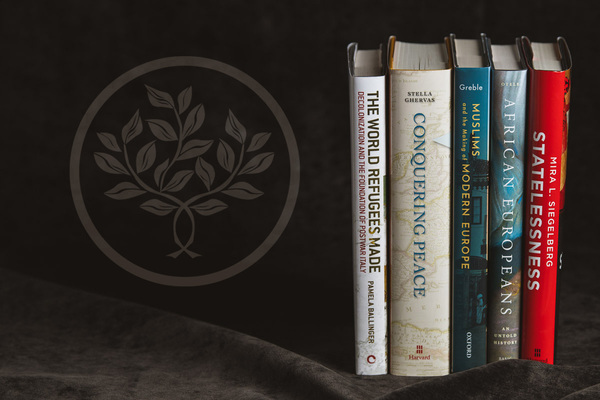
The Nanovic Institute for European Studies at the University of Notre Dame announces the 2023 shortlist for the Laura Shannon Prize in Contemporary European Studies. Carrying a prize of $10,000, the Laura Shannon Prize is recognized internationally as one of the leading book prizes in the field of European studies. Each year, the Nanovic Institute, which is part of the Keough School of Global Affairs, gives this award to the author of the best book in European studies that transcends a focus on any one country, state, or people to stimulate new ways of thinking about contemporary Europe as a whole.
The 2023 prize will be awarded to the best book in history and the social sciences published in 2020 or 2021. The winning book, which will be announced in January 2023, will be selected by a jury of five eminent scholars in European studies, at least three of whom are faculty at institutions other than the University of Notre Dame.
The finalists for the 2023 Laura Shannon Prize are:
- “The World Refugees Made: Decolonization and the Foundation of Postwar Italy” by Pamela Ballinger (Cornell University Press);
- “Conquering Peace: From the Enlightenment to the European Union” by Stella Ghervas (Harvard University Press);
- “Muslims and the Making of Modern Europe” by Emily Greble (Oxford University Press);
- “African Europeans: An Untold Story” by Olivette Otele (Basic Books);
- “Statelessness: A Modern History” by Mira L. Siegelberg (Harvard University Press).
Pamela Cheek, author of “Heroines and Local Girls: The Transnational Emergence of Women’s Writing in the Long Eighteenth Century” (University of Pennsylvania Press) and 2022 Laura Shannon Prize winner in the humanities, will accept the 2022 prize with a lecture on November 3, 2022. The 2023 winner of the Laura Shannon Prize will also accept their prize with a lecture.
Nominations for the 2024 humanities cycle (for books published in 2021 and 2022) are currently being accepted and are due by February 15, 2023. For more information on the nomination process, please visit the Nanovic website.
First awarded in 2010, the Laura Shannon Prize is made possible through a generous endowment from Mrs. Laura Shannon (1939-2021) and her husband Michael ’58. Mrs. Shannon served as a member of the Nanovic Institute’s Advisory Board for many years after joining in 2003. As well as her work in social services and family court mediation, she was a regular visitor to Europe, particularly to France where she honed her language skills and explored libraries and cultural centers. Mr. Shannon is president of MEShannon & Associates, a Houston-based financial consulting firm. The Shannons have two daughters, Claire (currently a member of the institute’s Advisory Board) and Kathryn, who are continuing their parents’ legacy of commitment to and engagement with the Nanovic Institute.
Brief summaries of the five shortlisted titles, as found on their publishers’ websites, can be read below.
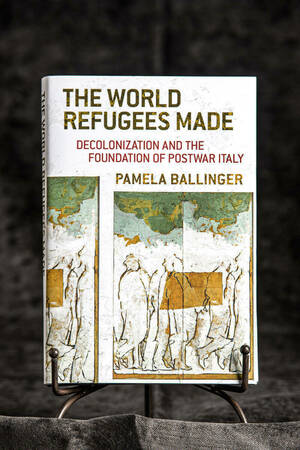
“The World Refugees Made: Decolonization and the Foundation of Postwar Italy” by Pamela Ballinger (Cornell University Press)
In “The World Refugees Made,” Pamela Ballinger explores Italy’s remaking in light of the loss of a wide range of territorial possessions—colonies, protectorates, and provinces—in Africa and the Balkans, the repatriation of Italian nationals from those territories, and the integration of these “national refugees” into a country devastated by war and overwhelmed by foreign displaced persons from Eastern Europe. Post-World War II Italy served as an important laboratory, in which categories differentiating foreign refugees (who had crossed national boundaries) from national refugees (those who presumably did not) were debated, refined, and consolidated. Such distinctions resonated far beyond that particular historical moment, informing legal frameworks that remain in place today. Offering an alternative genealogy of the postwar international refugee regime, Ballinger focuses on the consequences of one of its key omissions: the ineligibility from international refugee status of those migrants who became classified as national refugees.
The presence of displaced persons also posed the complex question of who belonged, culturally and legally, in an Italy that was territorially and politically reconfigured by decolonization. The process of demarcating types of refugees thus represented a critical moment for Italy, one that endorsed an ethnic conception of identity that citizenship laws made explicit. Such an understanding of identity remains salient, as Italians still invoke language and race as bases of belonging in the face of mass immigration and ongoing refugee emergencies. Ballinger’s analysis of the postwar international refugee regime and Italian decolonization illuminates the study of human rights history, humanitarianism, postwar reconstruction, fascism and its aftermaths, and modern Italian history.
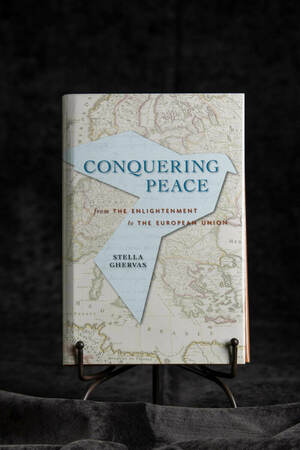
“Conquering Peace: From the Enlightenment to the European Union” by Stella Ghervas (Harvard University Press)
A bold new look at war and diplomacy in Europe that traces the idea of a unified continent in attempts since the eighteenth century to engineer lasting peace.
Political peace in Europe has historically been elusive and ephemeral. Stella Ghervas shows that since the eighteenth century, European thinkers and leaders in pursuit of lasting peace fostered the idea of European unification.
Bridging intellectual and political history, Ghervas draws on the work of philosophers from Abbé de Saint-Pierre, who wrote an early eighteenth-century plan for perpetual peace, to Rousseau and Kant, as well as statesmen such as Tsar Alexander I, Woodrow Wilson, Winston Churchill, Robert Schuman, and Mikhail Gorbachev. She locates five major conflicts since 1700 that spurred such visionaries to promote systems of peace in Europe: the War of the Spanish Succession, the Napoleonic Wars, World War I, World War II, and the Cold War. Each moment generated a “spirit” of peace among monarchs, diplomats, democratic leaders, and ordinary citizens. The engineers of peace progressively constructed mechanisms and institutions designed to prevent future wars.
Arguing for continuities from the ideals of the Enlightenment, through the nineteenth-century Concert of Nations, to the institutions of the European Union and beyond, “Conquering Peace” illustrates how peace as a value shaped the idea of a unified Europe long before the EU came into being. Today the EU is widely criticized as an obstacle to sovereignty and for its democratic deficit. Seen in the long-range perspective of the history of peacemaking, however, this European society of states emerges as something else entirely: a step in the quest for a less violent world.
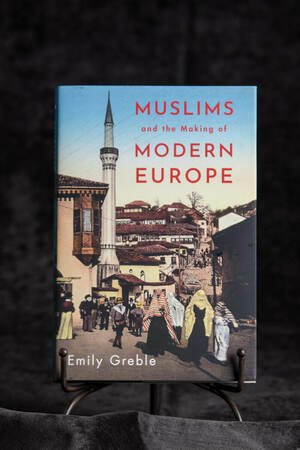
“Muslims and the Making of Modern Europe” by Emily Greble (Oxford University Press)
“Muslims and the Making of Modern Europe” shows that Muslims were citizens of modern Europe from its beginning and, in the process, rethinks Europe itself.
Muslims are neither newcomers nor outsiders in Europe. In the twentieth century, they have been central to the continent’s political development and the evolution of its traditions of equality and law.
From 1878 into the period following World War II, over a million Ottoman Muslims became citizens of new European states. In “Muslims and the Making of Modern Europe,” Emily Greble follows the fortunes and misfortunes of several generations of these indigenous men, women and children; merchants, peasants, and landowners; muftis and preachers; teachers and students; believers and non-believers from seaside port towns on the shores of the Adriatic to mountainous villages in the Balkans. Drawing on a wide range of archives from government ministries in state capitals to madrasas in provincial towns, Greble uncovers Muslims’ negotiations with state authorities--over the boundaries of Islamic law, the nature of religious freedom, and the meaning of minority rights. She shows how their story is Europe’s story: Muslims navigated the continent’s turbulent passage from imperial order through the interwar political experiments of liberal democracy and authoritarianism to the ideological programs of fascism, socialism, and communism. In doing so, they shaped the grand narratives upon which so much of Europe’s fractious present now rests.
“Muslims and the Making of Modern Europe” offers a striking new account of the history of citizenship and nation-building, the emergence of minority rights, and the character of secularism.
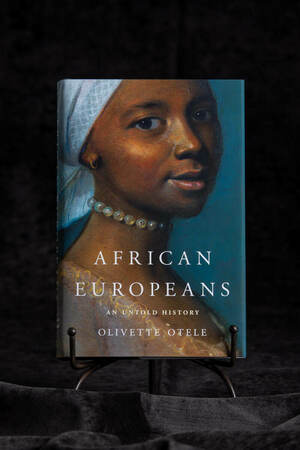
“African Europeans: An Untold Story” by Olivette Otele (Basic Books)
As early as the third century, St Maurice—an Egyptian—became leader of the legendary Roman Theban Legion. Ever since, there have been richly varied encounters between those defined as “Africans” and those called “Europeans”. Yet Africans and African Europeans are still widely believed to be only a recent presence in Europe.
Olivette Otele traces a long African European heritage through the lives of individuals both ordinary and extraordinary. She uncovers a forgotten past, from Emperor Septimius Severus, to enslaved Africans living in Europe during the Renaissance, and all the way to present-day migrants moving to Europe’s cities. By exploring a history that has been long overlooked, she sheds light on questions very much alive today—on racism, identity, citizenship, power and resilience.
“African Europeans” is a landmark account of a crucial thread in Europe’s complex history.
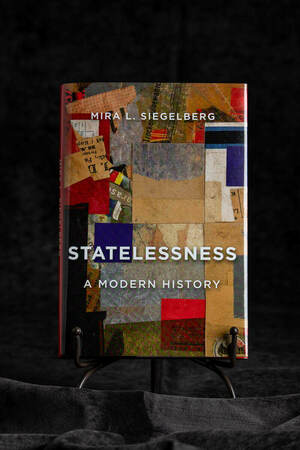
“Statelessness: A Modern History” by Mira L. Siegelberg (Harvard University Press)
The story of how a much-contested legal category—statelessness—transformed the international legal order and redefined the relationship between states and their citizens.
Two world wars left millions stranded in Europe. The collapse of empires and the rise of independent states in the twentieth century produced an unprecedented number of people without national belonging and with nowhere to go. Mira Siegelberg’s innovative history weaves together ideas about law and politics, rights and citizenship, with the intimate plight of stateless persons, to explore how and why the problem of statelessness compelled a new understanding of the international order in the twentieth century and beyond.
In the years following the First World War, the legal category of statelessness generated novel visions of cosmopolitan political and legal organization and challenged efforts to limit the boundaries of national membership and international authority. Yet, as Siegelberg shows, the emergence of mass statelessness ultimately gave rise to the rights regime created after World War II, which empowered the territorial state as the fundamental source of protection and rights, against alternative political configurations.
Today we live with the results: more than twelve million people are stateless and millions more belong to categories of recent invention, including refugees and asylum seekers. By uncovering the ideological origins of the international agreements that define categories of citizenship and non-citizenship, “Statelessness” better equips us to confront current dilemmas of political organization and authority at the global level.